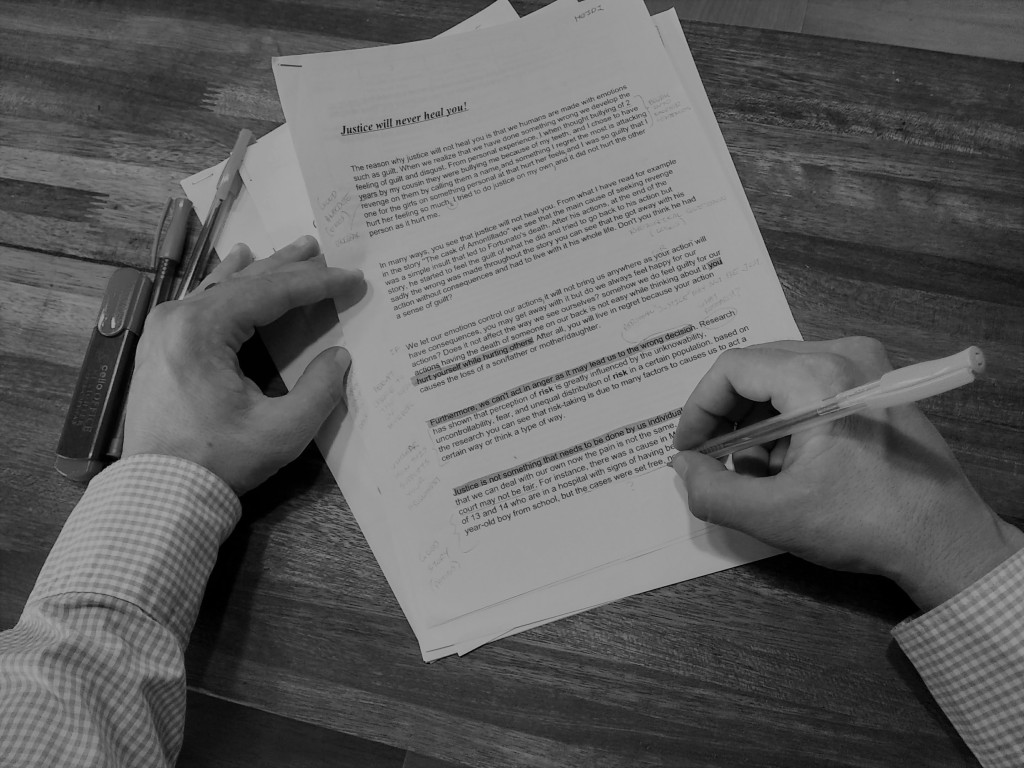April 30, 2021
By Aaron
I am annoyed. No, I am offended as I tirelessly click through to yet another mediocre student response, this one even more underwhelming than the rest. The crease in my brow settles in as I process the wreckage of ideas clumped across the page. The time it will take to untangle the knots and provide a meaningful postmortem to the author will be more than he took to write it in the first place. After a string of unimaginative thinking and off-topic analysis, the toxic voice of frustration whispers to me, “You know you clearly explained this assignment! They all practiced the skills. These students just aren’t trying hard enough. In fact, this work is not just lazy, it’s downright disrespectful.”
Beneath my annoyance at my students, my true unhappiness is with myself. I know deep inside that student failures are ultimately teacher failures. It feels like their mediocrity on this one assignment is a painful reflection of my own mediocrity as a teacher. The truth is that a large part of my self-worth is tied up in doing well at my job. Of course, to be fair, some of the students’ work was truly insightful and interesting. And honestly there’s only so much you can expect from young teens. Not every assignment will reap thoughtful scholarship on par with that of serious-minded graduate students. Sometimes good enough is good enough.
But it is not good enough.
And so the very next class, the students rewrite. I explain what excellence should look like and that I expect it of them. It requires me to revise my lessons, conference with students outside of class, and regrade work. It requires the students to put in much greater effort, attention, and time. It takes days, but in the end, the students’ work is undeniably better overall. But was it the right decision?

The unrelenting drive to do better empowers us and gives us agency. It holds us accountable for being our best selves and pushes us to reach personal, academic, and professional heights that might otherwise be out of our reach. But it can also destroy our peace and exhaust us.
Take for example a young woman I’ll call Erica. Erica is a natural and aware reader. She recently explained to me that she was finishing a book in spite of its insipid characters because she found the narrative arc intriguing. Erica is insightful, quick to smile, and presents as easygoing and competent. She also misses a day of school almost every week because the combined pressures of her school life and home life make her feel like she cannot function. Despite her academic abilities, she feels crushed by the course load and expectations of school. Earlier this year, I noticed a painting she had done for art class. It was the face of a woman, turned slightly and wearing an indistinct expression. The work was rendered in purples and blacks, the background fractured.

Erica is not alone. There are plenty of students in the middle and upper grades that have felt themselves crushed by the drive (or push) for excellence. These students’ struggles often remain invisible until they publicly panic over a lower-than-expected grade or are found crying outside of a classroom. Some just give up, certain that they won’t be able to live up to the standard of excellence that others expect of them, or that they secretly hope for themselves.
I empathize with these students. My own need to achieve some elusive form of professional excellence has resulted in years of long, focused days at work and nights, weekends, and summers dedicated to improving my presentation, behavior management, lessons, and units. Family, hobbies, and sleep are all sacrificed to this pursuit. Contentment is traded for stress. And yet there is never a breakthrough moment, never a point where I can stop and say, “I made it!” That’s the trap of chasing your best. You never achieve excellence; you can only pursue it. Because you can… Always. Do. Better.
So why not let good enough be good enough? A colleague friend at a previous school was skilled at this. Work didn’t stress him because he set firm boundaries on his time. He arrived on time and he left on time. Grading happened during school hours and his lessons and units stayed consistent from year to year, cutting planning to a minimum. His experience and natural, easy control of a class made him better than the average teacher, but he never had to be the best. Students liked and respected him, and because he knew how to let good enough be good enough, his students weren’t stressed either. He had balance.
But just as striving for the best has its costs, so too does giving up the struggle. I was recently considering easing my expectations for one of my classes. A good number had struggled to put in the effort and produce the quality of work required to meet expectations. Several “A” students found themselves with unflattering grades. Asking a lot of students runs the risk of producing resentment in some. Sensing a growing discontent among the students, I decided it was time to let good enough be good enough. Perhaps I had been unrealistic in my expectations, but the decision to abandon those expectations left me dejected. As I walked to my classroom, mind made up, a young man from that class stopped me to compliment my teaching. What did he like about it? The expectations.
Reflecting on this young man, I noticed something I had overlooked and discounted before. Each time I refused to credit his incomplete work, noted where otherwise good work could be better, or demanded more effort, he worked to meet those expectations. And he was not alone. Most of the class had slowly begun to put in more effort and turn in better work. While I was working on giving up on excellence, they were working on living up to excellence. The cost of letting go would be their success.
I never relaxed the expectations for that group. Of my five classes, they now have the second highest average grade. I envy people like my colleague who can find personal balance and contentment in their work. However, when it comes to school, good enough never feels good enough, not when doing just a little bit better might yield a better result. But I wonder, at the end of this endless pursuit, will I be glad for it? I can’t say.

With peace, love, and gratitude from Mauritius…